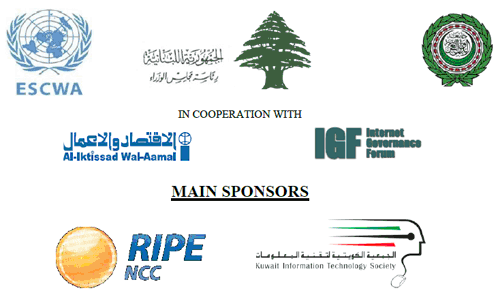The Conference and Public Consultations to Establish the Arab Internet Governance Forum (IGF) (Beirut, 31 January - 1 February 2012) was jointly convened by UN-ESCWA, the League of Arab States (LAS) and the Lebanese Presidency Council of Ministers (PCM). The Conference was co-sponsored by the Réseaux IP Européens (RIPE), and Kuwait Information Technology Society (KITS), and was held in cooperation with Al-Iktissad Wal-Aamal Group, the global IGF Secretariat, and the Arab Working Group on Domain Names and Internet Issues (AWGDNII).
The Conference resulted with a consensus to establish the Arab IGF, with the collaboration of multi-stakeholders in the IGF process and the Internet Governance activities for the region. It was attended by more than 60 participants from 14 countries, including Algeria, Bahrain, Egypt, Jordan, Kuwait, Lebanon, Morocco, Malta, Oman, Qatar, Saudi Arabia, the Sudan, Tunisia, and United Arab Emirates. Participants included experts from governmental, non-governmental and private entities from the Arab region, as well as from civil society, academic, and international and regional organizations.
The opening statements were delivered by Mr. Nadim Khoury, Deputy Executive Secretary of ESCWA, Mr. Khaled Foda, Manager of the ICT Department, LAS, and Mr. Samir el Daher, Advisor to the Prime Minister, Lebanese PCM. Inaugural sessions included notes that helped set the scene for the Conference consultations and discussions on the global IGF process and the needs and nature of the envisaged Arab IGF. A keynote statement entitled "Internet Governance Priority Issues: Global versus Regional Dynamics" was given by Mr. Tarek Kamel, renowned expert in the area of Internet Governance and Former Minister of the Egyptian Ministry of Communication and Information Technology.
The envisaged Arab IGF process will be the instrument to implement the Arab Regional Roadmap for Internet Governance that was prepared by ESCWA and LAS in 2010, and was overviewed and discussed during the Conference. Consultations were deliberated on the Arab IGF process in terms of components, mandate and positioning with respect to the global IGF secretariat and process, as well as the secretariat, partnerships, finances, tasks and responsibilities of host countries and stakeholders, and the multi-stakeholder advisory group. Consultants agreed on appointing Egypt as the host country for the Arab IGF secretariat, and on convening the first Arab IGF annual meeting in Kuwait in October 2012, noting that representatives from Algeria, Bahrain, Lebanon, and the Sudan also expressed interest in hosting subsequent Arab IGF events that will be taking place annually during 2012-2015.
The Conference outcome document outlined the Arab IGF process as a decentralized platform for inclusive policy consultations that involve all the stakeholders agreed upon in the Tunis Agenda and Geneva Declaration of Principles of the WSIS. It iterated the aim of the Arab IGF process, nature and mechanisms, its organizational framework, financing of activities, and periodic convening of its meetings. The LAS secretariat delivered the Conference outcome document to the meeting of the Executive Bureau of Arab Telecommunications and Information Council of Ministers (ATICM) (Beirut, 2 February 2012), which has commended on the Arab initiative to establish the forum and called upon Arab countries to actively participate in its process.
The conference committee and global IGF secretariat initiated remote participation in the Conference, and briefs from consultations were posted during the Conference on the social media platforms, namely on Facebook and Twitter: http://www.facebook.com/ArabIGF and http://twitter.com/igfarab.
Inquiries should be addressed to:
Mr. Ayman El-Sherbiny, Chief, ICT Policies Section, ICT Division, UN-ESCWA, Tel: +961 1 978 546, Fax: +961 1 981 510
el-sherbiny@un.org, escwa-ictd@un.org
Ms. Hania Sabbidin DIMASSI, Research Assistant, ICT Division, UN-ESCWA, Tel: +961 1 978 546, Fax: +961 1 981 510
dimassi@un.org, escwa-ictd@un.org
